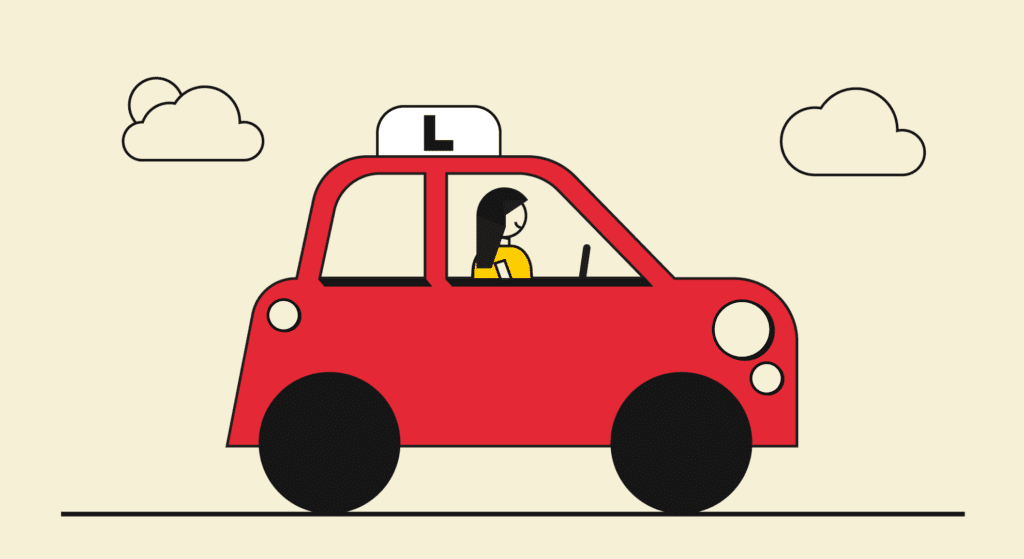No matter how old you are, you will always remember learning to drive. Whether you can recall your driving instructor, the car, first lesson, where you learned, your theory, or your practical test, parts of it will always stay with you.
For many people reading this, you will either be about to learn or – like our interviewee – in the middle of learning to drive. For those people, you are, or are about to, make lifelong memories as you pass through a watershed moment in your life.
The practical and the emotional
Many articles about learning to drive focus on practical advice, like how to book your test and what you need to remember, but it’s an emotional time: from receiving your provisional licence and those nerve-wracking first lessons to the elation you feel when your examiner says “you’ve passed.”
Seventeen-year-old Sophie Cooper is, at the time of writing, learning to drive. In our conversation, she describes not only the practical things she’s learning but how she felt at various stages of her journey: the nerves, the building confidence and her hopes for passing first time.
Meet learner driver Sophie
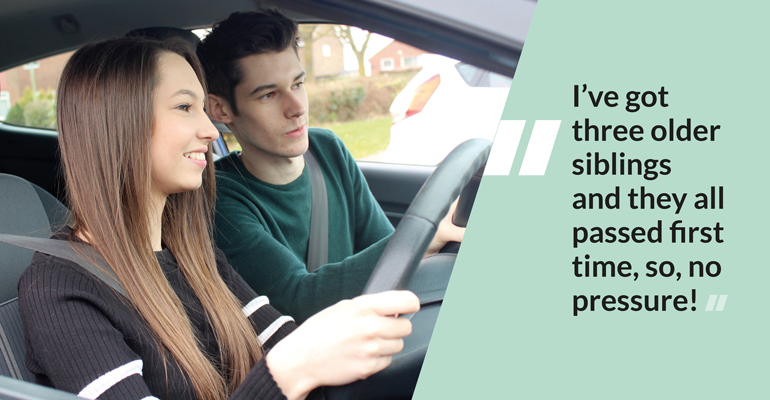
Sophie is from Lowestoft, the most easterly town in the UK. She has three older siblings, all of whom now drive and all of whom passed their tests first time. “No pressure!” She says.
Before the first lesson
“Before I started learning to drive I was excited, but as the day got closer I got more and more nervous. In fact, I was incredibly nervous. I didn’t know anything, I didn’t have any driving experience but I was keen to start driving.
“Some people have a go around private land or drive with their parents before their first lesson just to get used to it, but I hadn’t done that. I was scared that I wasn’t going to get it right because I’d been thrown in at the deep end – which most people are, I guess.”
What’s it like, learning to drive?
Sophie tells us how she’s a “September baby,” which means she’s one of the first people in her year to learn to drive. As such, she only has one friend who’s learned to drive before her.
“She said ‘don’t worry about it’,” explains Sophie, speaking to us in a free period before she goes back into a class at college. “‘The instructor will go at your speed and won’t push you to do anything that you’re not comfortable with’. Which is good! But still nerve-wracking.”
While talking to friends about their experience of learning to drive can be helpful, it can also make you more nervous: if they say it was awful, you might start to worry; if they say it was easy, you might feel the pressure to find it easy. As you know, sometimes people don’t recall experiences like it was; someone who says it was easy may have found it hard but feel embarrassed to say so! Just like Sophie, most people feel a mix of nervousness and excitement. After all, as she says, “It’s a big responsibility to be in charge of a car!”
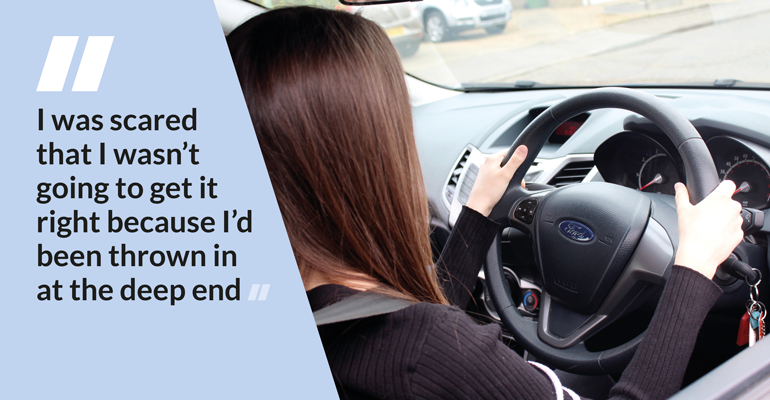
“I have three older siblings, and they all drive me around a lot at the moment. I’ve asked them about what it was like to learn to drive, how they felt about it. They all said it was fine, that they loved it and that they were buzzing after their first lesson.
“My parents encouraged me, taught me that it’s an important skill to learn, but they made it my choice.”
Why learn to drive?
We ask Sophie why she wanted to learn to drive and she pauses to think before saying:
“The practicality of it. You have to learn to drive because it’s an important skill to have for work. It’s good to pull out of the bag if people want you to go on a course or event out of the office, you can say, ‘yes I can drive’.
“Independence is a big part of it,” she adds thoughtfully. “When you have your own car you can go where you want, but mobility for jobs is the most important thing for me.
“I don’t have any specific plans or trips I want to do when I pass, but I guess I would like to go out with friends – maybe into Norwich [the nearest big city, 27 miles away]. I might be able to go on holiday in it too.”
What’s your dream car?
You’re probably thinking of your own reasons for wanting to learn to drive: many of us live in the countryside, villages or small towns miles from our friends, and a car is certainly an upgrade from a bicycle! Some people, like Sophie, can see the practical benefits for their career. Others grow up with a passion for cars and have their heart set on a specific make and model – although you don’t always get what you want, as Simon from The Inbetweeners found…
But Sophie’s no Simon: “I’m quite realistic about what car I would get. I’m not a big car fan or anything so I don’t want anything flashy.”
We chat about cars and Sophie admits that she would actually quite like an Audi A1.
“I’d like an Audi A1 because they’re small. I’m quite small so it would be practical for me. I’d better start saving now!”
Why not have a look at our list of cheap cars to insure for younger drivers.
What was it like to receive your provisional licence?
“It was nerve-wracking because all the talk becomes real,” explains Sophie. “You talk lots about driving and learning to drive, and then your provisional licence arrives and it’s like: it’s official – you will be learning to drive now! It’s exciting too.”
Getting insured to drive a car – your parents’ car, a friend’s car, your own car if you have one – means that you can practise driving in between lessons. This gives you the opportunity to improve on aspects of your driving that might need work – from parallel parking to using a satnav.
People assume that it’s very expensive to get added on to their parents’ insurance policy, and they’re not wrong. Learner driver insurance however, is much less expensive. For example, Adrian Flux customer Harry Dodds was one of the first people to take out learner driver cover when he was 17.
Harry took out a three-month policy costing £175 – saving a massive £750 compared to being added to his father’s annual policy. The separate policy also meant that his dad wouldn’t lose his No Claims Bonus if an accident occurred. If you want to practise in your parents’ or someone else’s car, read more about how learner driver insurance works.”
The theory and hazard perception test
“I haven’t done it yet, but it’s booked in,” says Sophie, showing her excitement. “I’m studying for it and I’m pretty confident about passing that.
“I’ve done a few mock tests to see how I’m doing and I get about 43 or 45 – which is a pass.
“There are some tricky parts where the question is quite similar to the answer which can throw me off. And there are some where they want one answer but two or three look like they’re right which I get tripped up on.”
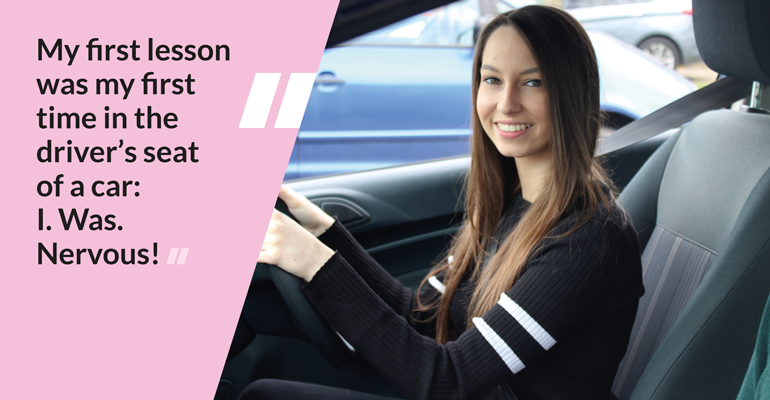
There are some good ways to ensure you pass your theory test first time. It’s nice to pass first time, not least because it’s £23 a go! The government have created a resource page with an online version of the Highway Code and a handy book called Know Your Traffic signs, which you can buy for £4.99 (many people buy one and sell it on to a friend to cover costs).
We ask Sophie: what’s the most important lesson you’re learning from theory test study? She pauses thoughtfully again.
“It’s all important. I guess it’s awareness: being aware of your surroundings, checking in your mirror before you do anything. I’ve learned that it’s important to recognise that whatever you do will affect the person behind you as well.”
First driving lesson: first experience driving
“My first lesson was my first time in the driver’s seat of a car,” says Sophie enthusiastically before adding: “I. Was. Nervous.”
“My instructor was very welcoming and made sure I was calm before getting in the car. He told me it’s important to be calm and relaxed when you drive because it’s when you’re not relaxed that things can go wrong. He reassured me and said that if I was struggling I could just tell him and he would take control or he could explain certain things again.
“He really helped to settle my nerves and make me feel OK behind the wheel. I mean, I was still nervous, but I felt better about it.”
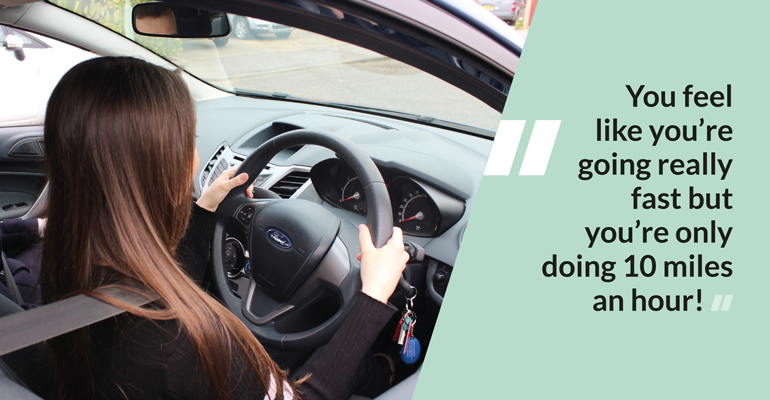
Many people don’t remember their first lesson because you’re full of adrenaline while you concentrate on all the new things you have to do: the gears, the pedals, the road, the instructor and not crashing. If you, like Sophie, have had 10 lessons or more, can you remember that very first lesson? Or is there something else you remember more?
Sophie certainly still remembers:
“There’s a road near me where all learners do their first few lessons. It’s very wide so you can do manoeuvres and I didn’t have to worry about other cars.
“The first thing my instructor did was go through the controls: how to palm the gears and so on. Then he went through the clutch control and accelerator, and told me how to time them right so you have a smooth transition from gear to gear.
“I was really nervous,” she can’t help but say again. “You feel like you’re going really fast but you’re only doing 10 miles an hour. I guess it’s because suddenly it’s your responsibility – you’re responsible for this big thing and the person sitting next to you.
“Actually it didn’t take me too long to get the basic hang of it in that first lesson. I definitely improved, because by the end of my first lesson I’d done a U-turn and gone up to 20 miles an hour and third gear, so I must have improved.”
That first driving lesson is certainly the steepest learning curve: you start off having never driven a car before, an hour later, you’ve driven a car. We can hear the relief and a quiet sense of pride as Sophie reconnects with that feeling of unease and the achievement of getting the hang of it.
One of Sophie’s challenges was one she shares with many first-time drivers: clutch control. “I was very jerky.” Even experienced drivers find this when they drive a car they haven’t driven before: finding that ‘biting’ point and working out how fast the clutch engages. Your foot wants to learn where the point is and how slowly to release it.
Some cars have very sharp biting points and it can be hard to give a smooth transition. Other cars have long and smooth clutches which means that while you have to move your foot up and down more, it’s easier to give a smoother ride. If you’re new to driving, don’t be surprised if you stall now and then. Once you’ve had a few lessons, it all becomes muscle memory – you stop thinking about it and your foot knows instinctively how much to move and how quickly.
More lessons in Sophie’s future
Sophie’s had about 20 lessons and will be taking both her theory and practical driving tests soon. The journey to taking your test isn’t always smooth and many people have areas that they still have to improve on and master before their instructor will let them book their test.
“I was dropping the clutch too quickly and would set off quite fast so I’d then start to panic. Changing gears came more naturally to me over time. Clutch control was still a bit of an issue but through more practise it is now one of my strongest points.”
People who have been driving for years will often tell you that they ‘don’t even think about it anymore’. To a learner who has multiple instructions and actions to remember while driving on an empty road at 20mph, this may sound worrying. But as you get nearer towards taking your test, you’ll realise that some of the things you had to consciously think about, are now just happening – you’re just doing it. For example, you can just feel where the gears are, you just know how much to turn the wheel, you sense how much space to give the other side of the car and the kerb. Driving always involves concentration, but it takes less mental effort as time goes on.
“The most important thing I’ve learned is that you have to be relaxed before doing anything. If you’re not relaxed it can be dangerous.
“I also learned that you have to think quickly but act slowly to make everything smooth.”
“You have to think quickly but act slowly”
What’s next?
Sophie is nearly at the end of learning, and will soon – if all goes well – pass her test and be allowed to drive unaccompanied. But she has one more bridge to cross.
“The only thing stopping me now is my confidence,” she says. “I’m addressing it, I’m staying calm. In my last two lessons I was thinking ‘I need to stay calm and remember that my instructor is next to me so nothing can go wrong.’ He’s said that my confidence is growing and that my driving is improving because of it – so hopefully from now on it’ll be ok.”
Most instructors will conduct a mock test to get learners used to what happens: emergency stops, manoeuvres and the scoring structure. Mock tests are a great way to help feel comfortable on the big day.
Sophie hasn’t had a mock test yet, but her instructor is planning one.
Another thing many instructors suggest is for you to bring a passenger. This is to give you some experience of what it’s like to have someone in the car.
“I think it’ll be fine,” says Sophie. “I don’t think that will phase me, I’d just forget they’re there and concentrate on what I’m doing really.”
Sophie will doubtless be fine, but it can feel strange having someone you know sitting behind you in the car for the first time – a parent or friend. But, as Sophie says, your attention will be on the road and you’ll quickly forget that they’re there.
The driving test looms
“My instructor hasn’t told me much about the test yet but I know what some of the manoeuvres will be and that I have to use the navigation system [satnav] and follow that for 20 minutes of the test. That bit’s new, I think the government introduced that in December [2017]. I’m feeling OK about the satnav part because I’ve seen them in other cars and they seem fine.”
Through practise and studying for her theory test, Sophie has built her skills and confidence and looks set to take and pass her test soon.
What’s one piece of advice you’d give to learner drivers?
We have one last question for Sophie. How would you describe the driving lesson process to someone who is about to start learning to drive?
“It is nerve-wracking but it’s an amazing opportunity – once you’ve learned to drive you can go anywhere. Also, it’s good to get it in early, when you’re young and it’s good to have on your CV, it’s so useful.”
We wish Sophie good luck in passing her test and many happy years of safe driving on the road!
Get learner driver insurance from Adrian Flux
If you’re learning to drive with family or friends, it’s important that you have the right insurance policy in place. At Adrian Flux, we offer affordable learner driver insurance from just 65p a day. Call us on 0800 369 8590 for a quote or book a callback at a time that suits you.
